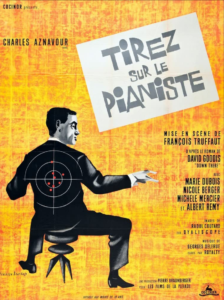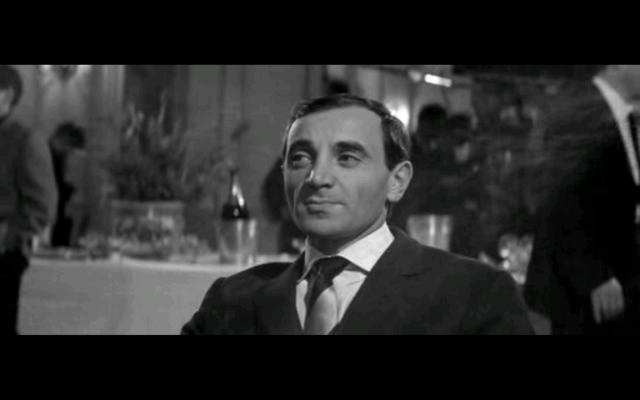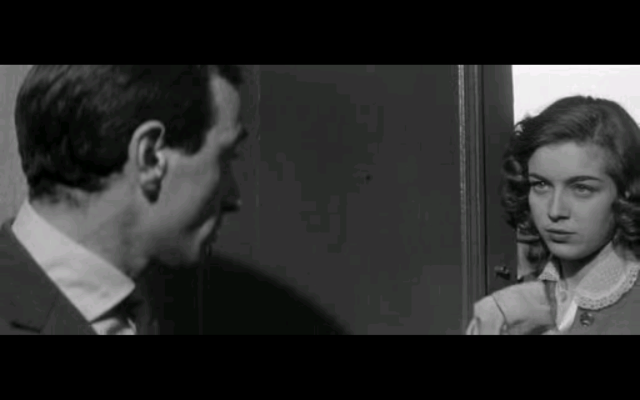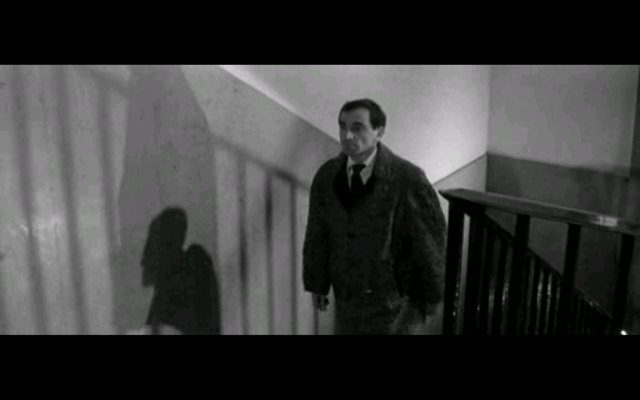Shoot the Piano Player (1960)
“Lost in the night, you can’t stop the shadows from moving in.”
|
Synopsis: |
|
Genres, Themes, Actors, and Directors:
Response to Peary’s Review: While I’m not sure I would agree with Peary that NO other film does any of these things better (!), his overall sentiment is well-taken — and it’s true that this remains one of Truffaut’s most cinematically innovative and provocative films. In his insightful analysis of the film’s thematic arc, Peary notes:
Adding to the film’s enduring enjoyment is Aznavour’s “oddly moving performance” in the title role; an enormously popular French singer in real life, here he plays a “meek pianist who works in a bar”, a former “successful concert pianist” who has “withdrawn into anonymity” after the suicide of his wife (Nicole Berger). While nursing his considerable emotional wounds, he’s faced with life-threatening trouble on the homefront, given that “gangsters [are] trying to get revenge on [his] two adult brothers for double-crossing them after a robbery”. He gains temporary comfort from a friendly neighborhood hooker (Michele Mercier), and attempts a tentative romance with barmaid Marie Dubois (lovely in her first credited film debut) — but it’s clear that more trouble than joy is in store for our “timid” protagonist, whose desire for a life of simple contentment continues to elude him. Note: Peary gives away major spoilers in his review, so be forewarned. Redeeming Qualities and Moments:
Must See? (Listed in 1001 Movies You Must See Before You Die) Categories
Links: |





One thought on “Shoot the Piano Player (1960)”
A surprising must.
I just realized the only time I saw this before now was when I was in my early teens. I remember liking it at the time but I certainly appreciate it more now that I’m older.
What may be of particular interest to ffs is the fact that ‘STPP’ shows a very different side of Truffaut – certainly an equally adventurous side, on the heels of ‘The 400 Blows’. Unlike his first major film, however, ‘STPP’ is at once typical and atypical Truffaut. That could be the main reason why I generally prefer this type of film coming from him: material from another source onto which he can stamp his sensibility.
Oddly, the film starts out with what appears to be unsure footing: a man is being chased; he runs smack into something, knocking himself out; a stranger assists him and the two immediately embark on a conversation about the value of marriage. Wha~??? (That is not the only element which seems out-of-place: the thugs who end up chasing Aznavour have a rather hilarious way of ‘entertaining’ their captives. Some of those exchanges are priceless.) But we soon accept the way Truffaut is at play with experimentation and the film picks up fierce momentum. Throughout, the ingredients of the film may seem at constant odds with each other. But they blend satisfyingly as the film reaches its conclusion.
Apparently this was a box office failure – but is now held in rather high esteem. As it should be. I don’t tend to revisit Truffaut’s films often at all, though I admire many of them. Seeing this again after such a long time, I’m floored by how fresh it seems – it reminds me of the director’s career-long efforts to challenge himself (tho, of course, I don’t ultimately see that much value in the bulk of the Antoine series). He certainly set a challenge for himself here which pays off handsomely.
I believe it’s now among my favorite Truffauts. Fifty years on, ‘Shoot The Piano Player’ is a film that is very much alive!